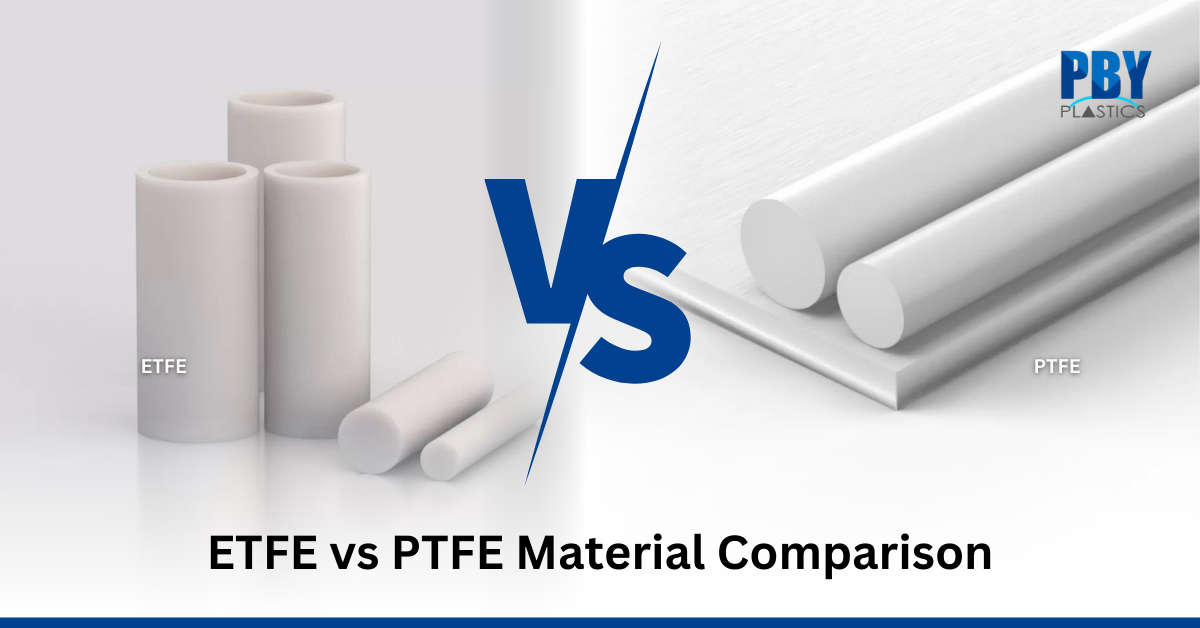ETFE vs PTFE: Material Comparison

ETFE (ethylene tetrafluoroethylene) and PTFE (polytetrafluoroethylene) are both fluoropolymers that share some characteristics but also have distinct properties. Understanding these differences is essential for selecting the appropriate material for a specific use case. Each has unique mechanical properties and is highly durable, making them both suitable for various industrial and commercial applications.
Chemical Structure
Ethylene Tetrafluoroethylene (ETFE) is a copolymer composed of ethylene and tetrafluoroethylene. This unique combination offers high strength and flexibility. On the other hand, Polytetrafluoroethylene (PTFE) is a linear polymer consisting solely of carbon and fluorine atoms, known for its remarkable inertness and low friction properties.
Below is a visual representation of their polymeric structures.
The chemical structure of ETFE:

The chemical structure of PTFE:
Properties
Temperature Range
ETFE can endure temperatures from -185°C to 150°C (-300°F to 300°F), making it suitable for a wide range of environments. PTFE, however, boasts a broader range, withstanding temperatures from -260°C to 260°C (-460°F to 500°F), ideal for extreme conditions.
Mechanical Strength
ETFE has a higher tensile strength and is highly resistant to abrasion, impacts, and tearing. This makes it ideal for applications that require high durability, such as cable insulation, roofing membranes, and inflatable structures. PTFE, on the other hand, It is commonly used in bearings, seals, and gaskets.
Chemical Resistance
Both materials excel in chemical resistance, with PTFE offering unmatched inertness to almost all chemicals. ETFE also provides excellent resistance but is slightly less robust than PTFE in certain harsh chemical environments. ETFE may be susceptible to oxidizers, esters, ketones, and chlorinated solvents but resists organic solvents, acids, and alkalis.
Electrical Insulation
PTFE is favored in electronics due to its superior electrical insulation properties, while ETFE provides good electrical capabilities, making it suitable for various high-performance applications such as telecommunications and fiber optics wires.
Radiation Resistance
ETFE resin exhibits excellent resistance to gamma radiation compared with PTFE, which makes it more suitable for applications in nuclear power plants and other radiation environments.
- PTFE gamma tolerance is 5 KGY (Kilogray)
- ETFE gamma tolerance is 1000 KGY
Transparency
ETFE offers transparency, allowing light transmission, essential for architectural applications. Conversely, PTFE is opaque, limiting its use in applications where transparency is beneficial.
Applications
ETFE is commonly used in architectural applications, such as roofing and facades, due to its transparency and UV resistance. It also finds applications in electrical insulation and chemical processing equipment. PTFE is widely utilized in the chemical industry, electronics, aerospace, and medical fields, known for products like gaskets, seals, and wire insulation.
PROS and CONS
ETFE:
- PROS: High tensile strength, flexibility, radiation resistance, transparency
- CONS: Lower temperature range compared to PTFE
PTFE:
- PROS: Superior temperature resistance, excellent chemical resistance, low friction
- CONS: Opaque, non-melt processable
Conclusion
ETFE and PTFE each offer unique properties that cater to different industrial needs. ETFE, with its strength and transparency, is ideal for architectural and electrical applications. PTFE is the material of choice for demanding environments requiring high temperature, chemical resistance and low friction. Ultimately, understanding the distinct characteristics and applications of each material is crucial in selecting the best option for a specific use case. Therefore, it is essential to consult with technical experts to make an informed decision based on your particular requirements. With proper selection and implementation, both ETFE and PTFE can provide long-lasting and effective solutions for various industrial applications
For industrial applications requiring the exceptional properties of ETFE or PTFE, contact us to discuss your specific requirements. Our team of experts can help you select the best material for your application and provide custom solutions to meet your needs. Trust our experience and expertise in fluoropolymer materials for optimum results in your projects. So, make an informed decision and choose the right material for your next project. Keep exploring our website to learn more about how we can assist you!
